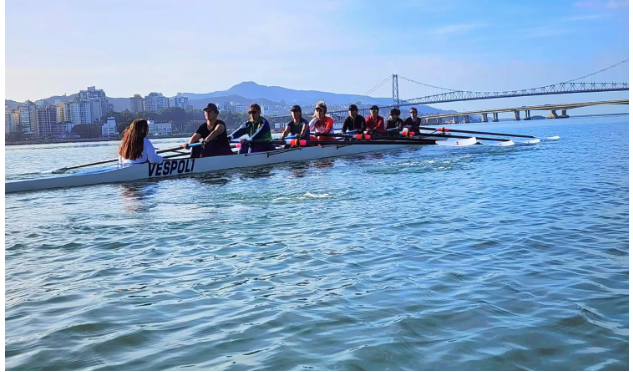Imogen Frazier
Pé na areia, literally translating to “foot in the sand”, is how Brazilians describe the pleasure of being at the beach. As I type this, I am currently sitting at a restaurant pé na areia and sipping a cool glass of passion fruit juice, or suco maracujá, for which I will certainly have saudades1 back at Wes.
Over the past three months under the Middlebury Language Pledge, I have come to appreciate the vastness of the Portuguese language. With 100,000-300,000 words more than English (depending on the source), Portuguese lends itself to describing experiences with great precision.
Upon arrival in Florianopolis, Brazil, I was unspeakably nervous at the prospect of taking all my classes in such a language. As one of just three American students entering a prestigious public Brazilian university with over thirty-thousand students, my fear of academic failure and social rejection was staggering. I nearly cried of anxiety as the wheels of the plane touched the ground after over eighteen hours of travel.
On the first day of classes, though, my nervousness melted away. In each classroom I entered, I was met with overwhelming amity: smiles from peers, offers to help with any tough material, study together, eat lunch together, and genuine interest in exchanging viewpoints and experiences outside of the classroom. Through forming friendships entirely in Portuguese, I have been forced to consider, in everyday conversations, how to translate my personality. Just as there is no direct translation for saudades, I have found there is no direct translation of myself.
As much in my social life as in my studies and extracurriculars, living in another language has pushed me to pause more— to choose my words with a care and intention that my native tongue didn’t always demand. This semester, I have had the honor of interning with an international relations research group at the Universidade Federal de Santa Catarina called Eirene-Amefrica, which is run by a brilliant professor. Through discussions on migration through the lens of race and gender, I have begun to understand international relations from a perspective I wasn’t exposed to in the U.S.
Likewise, in my class History of International Relations, my positionality as an American is constantly noted by the professor. It’s fascinating to observe which world events are highlighted in history here as opposed to at Wesleyan. Being that the U.S. plays a key role in the international community, the class gives me a window into the Brazilian perception of American history and culture as well. In International Negotiation class, the professor often reminds us that many of the well-known sources we read propose a style of negotiation designed for countries and corporations that occupy spaces of great power globally, and that these methods often don’t function for countries in Latin America. The class History of Santa Catarina has given me essential context for living here. In particular, untangling the inter and intra state dynamics through writing and reading sources in the original language has helped me navigate conversations with my host family, who are originally from the interior of Santa Catarina (though they’ve been residents of Floripa for over thirty years). This class has caused me to reflect on the surprising number of parallels between Brazilian and U.S. history, too. Currently, I am struggling my way through writing an “artigo”, or ten to twenty page research paper. The subject is the politics of a women farmers movement against food insecurity in the west of Santa Catarina over the past two decades.
Perhaps the most thrilling embarkment of my semester has been continuing to cox. At Wesleyan, I walked onto the crew team as a coxswain freshman fall and quickly fell in love with the sport. Being a history nerd, I knew Florianopolis had a long tradition of coastal rowing and before departing from the states I sent a message to the oldest club on the island, Aldo Luz Clube de Regatas. The club has been functioning for over one hundred years and the boathouse is very chic. (To make things better, their logo is red — roll cards🟥🐦) After speaking with the trainer on the phone and going in for a trial day, I was able to get out on the ocean!

There are lots of differences between Aldo Luz and the Wesleyan team. The lack of microphone, coxbox, and English make it notably more difficult to deliver instructions. The ocean waves don’t help, either, but the scenery is magnificent. My first time in a boat here I felt like a caloura, or first semester freshman, all over again but with time I have adjusted. Now, about four days a week I wake up at 5:40 a.m., hitch a ride with one of the rowers and hop in a boat. The experience has not only helped my fluency in the language and my confidence in coxing, but it has also amplified my connection to community and culture here. I’m truly grateful and will certainly have saudades when I leave in December.
- Saudades — the quintessential Portuguese word with no direct translation that describes the heart-wrenching emotion felt when missing something. The word references a sentiment deeper than a simple “miss you.” ↩︎


